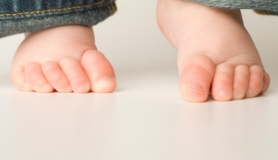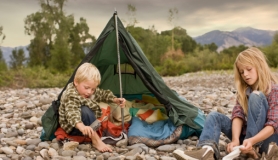Despite this, most people feel that the benefits of shoes outweigh the negatives.
However, a growing number of people are binning their boots and turning their backs on shoes for good. The benefits, they believe, are so worthwhile that they are going out to eat, doing their grocery shopping and even going to work (within reason) barefoot. While the Carrie Bradshaws amongst you will be squirming in your seats, the reasons for going barefoot are certainly compelling.
The basic premise of going barefoot is that it is optimal for healthy feet, even when shoes are comfortable and fitted correctly. Several studies have shown that shoe free societies suffer far less with bunions, deformities and foot pain. Likening shoes to a cast, Steven Robbins MD of Concordia University, Montreal explains that shoes hold “the bones of the foot so rigid that they can’t move fluidly”.
More interesting theories suggest that going barefoot grounds our bodies to the negative ionic charges of the earth, due to our high water volume. These negative Ions are associated with reduced stress levels, reduced levels of inflammation and can even be detoxifying. The best place to go in order to experience the full benefits of negative ionic charge is, reportedly, by the sea. Going barefoot on the grass has also been associated with a significant reduction in depression and anxiety.
Small wonder, then, that the barefoot movement is campaigning hard against its detractors. While it isn’t illegal to be barefoot in a public place, many find themselves facing controversy and requests to leave various establishments. Others have faced pressure from employers. Though being barefoot is not associated with any significant health risks to the barefoot person, other than injury, or to those around them, common misconceptions mean the battle for the right to go without shoes is on-going.
If you are interested in the benefits of being shoe free, but don’t wish to be full time there are many ways to approach being barefoot. Some people simply choose to take their shoes off more often at the park, on a nice walk or by the beach. Others also invest in special shoes, such as Vibram fivefingers, so that their feet remain flexible and they are less anxious about social situations. Young children and toddlers can also go without the typical “cruiser” and “walker” shoes and, instead, remain in soft soled leather shoes for a number of years. Ultimately, there is no right way to be barefoot, only what feels good and comfortable for you.
However, there are a few important things to remember: At first it can take a while for the soles of your feet to toughen up and you will be hyper sensitive to changes in temperature, texture and tiny lumps and bumps. You will also be watching every step you make, taking care to avoid broken glass, people in shoes and other hazards. With time, it will become much easier. Extreme temperatures, however, may require shoes.
For more information check out www.barefooters.org







